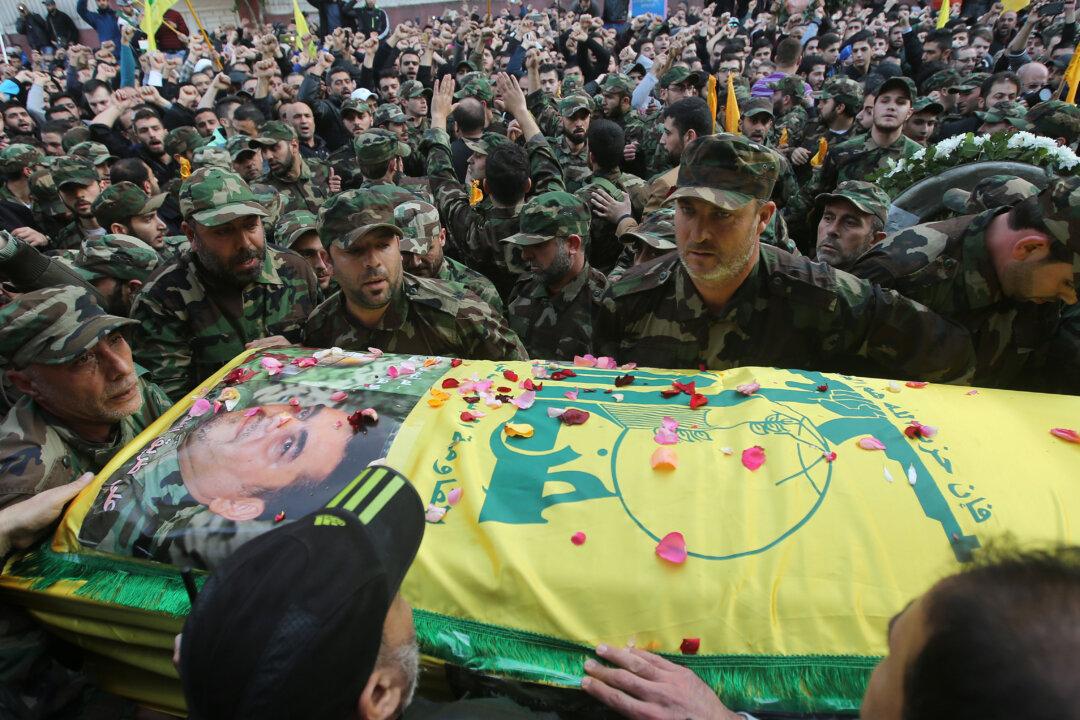BEIRUT—Amid shouts of “death to Israel,” thousands of Hezbollah supporters on Monday thronged the coffin of a high-profile Lebanese militant who the group says was killed by an Israeli airstrike near the Syrian capital.
The group’s leader pledged to strike back at the Jewish state, but refrained from making any fiery threats during a speech addressing the assassination.
Hezbollah said Samir Kantar, who spent 30 years in an Israeli prison after being convicted of the 1979 murders of an Israeli policeman along with a father and his 4-year-old daughter, was killed Saturday along with eight others in the airstrike on a residential building in Jaramana.
Hezbollah officials had pledged to avenge his killing, sparking fears of escalation in a volatile region.
Hezbollah leader Sayyed Hassan Nasrallah, in a televised speech Monday evening, said the group will exact revenge but did not make any specific threats.
“It is our right to retaliate for (Kantar’s) assassination in the place, time and manner we deem appropriate. It is our right, and I will add tonight, that we in Hezbollah will practice this right with the help of God,” he said.
Earlier Monday, crowds at Kantar’s funeral swarmed his coffin, which was draped with a yellow Hezbollah flag.
“Death to Israel,” the men shouted, waving their fists in the air, as women threw rice and petals at the coffin.
“If the Israelis imagine that by targeting Samir Kantar they have closed an account, they are very wrong because they know and will know that they have opened accounts that are not closed with a treacherous missile,” senior Hezbollah official Hashem Safieddine said at the funeral.
Israeli has neither confirmed nor denied that it was behind Kantar’s assassination.
In Lebanon, Kantar is known as “the dean of Lebanese prisoners,” a reference to his long jail sentence in Israel.
In Israel, he was notorious for the kidnapping and grisly killing of a father and his 4-year-old daughter in the coastal town of Nahariya. Kantar was 16 at the time and a member of the Palestinian militant group the Palestine Liberation Front.
He also killed a policeman during the attack and is alleged to have beaten the four-year-old to death with a rifle butt—a charge he denies. He was imprisoned in 1979 in Israel and sentenced to three life terms, but was released as part of a prisoner swap with Hezbollah in 2008. While many in Israel were outraged at his release, in Lebanon he received a hero’s welcome.
Israel and Hezbollah are bitter enemies. The two countries battled to a stalemate during a monthlong war in 2006 during which Hezbollah fired thousands of rockets into Israel and Israel’s air force destroyed wide areas in Lebanon. Since then, Israeli military officials say Hezbollah has upgraded its capabilities and now possesses tens of thousands of rockets and missiles capable of striking anywhere in the country.
Kantar was to be buried in the Rawdat al-Sayida Zeinab cemetery that contains the graves of many Hezbollah fighters and commanders.
Hezbollah has sent thousands of its fighters to Syria to shore up President Bashar Assad’s forces in the country’s civil war. More than a quarter of a million people have been killed and millions displaced.
On Monday, the Al-Jazeera news channel said one of its correspondents, Sohaib Al Khalaf, was wounded in Russian airstrikes on the northern Syrian city of Idlib.
It did not say when the incident took place, but opposition groups on Sunday reported that suspected Russian airstrikes on Idlib killed more than 30 people and wounded many others.





